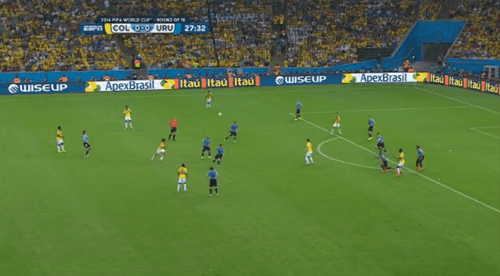Well, that was a short ride for my beloved Celeste (although longer than some expected). Today I want to share my thoughts on Uruguay’s World Cup campaign and the team’s future, as well as a great story about the Colombian team that I missed in my last post.
Football in Sun and Shadow
Uruguay played four games in this World Cup, winning two and losing two, and reached the round of 16 for the second consecutive tournament. I know some people were expecting more from this team, but given the group they were in and all of the other factors at play, I think that’s a respectable showing. Not only did they manage to defeat a European nation in the Cup for the first time since 1970, but they did it twice in six days, and the rivals were former world champions. Unfortunately, in taming the old world they forgot how to beat the new world, falling to both Costa Rica and Colombia.
Would the story have been different if He-Who-Must-Not-Be-Named had been on the field against either the Ticos or the Cafeteros? I’m saving my thoughts on that whole issue for a future post, but ultimately there were legitimate reasons for him not to be on the pitch, so I’m not going to worry about it. Uruguay put the best team they could on the field, and it was defeated by two teams that were better. Could we argue about what would have happened if Edinson Cavani hadn’t missed a sure chance at going up 2-0 in the first game? Yes we can. Can we discuss how the Colombia game plays out if Fernando Muslera gets just a little bit more of his hand on that James Rodríguez shot? Sure, you can do that if you want, but the truth is Uruguay was outplayed and it lost, and that’s that. All that’s left is to congratulate the winners and move on.
Gastón Ramírez lets his disappointment show after Uruguay’s elimination from the World Cup. I don’t know what the hell Christian Stuani is doing back there.
So how does Uruguay continue forward from this? Well, first and foremost they need to figure out what’s going on with their biggest star, because they’re clearly a different team without him on the field. At the same time, they need to develop options on offense so that they can lessen their reliance on one player. This needs to happen within the context of a generational rotation that already started in Brazil, with the replacement of the Diegos (Forlán, Lugano, and Pérez). Uruguay is a veteran team, but it does have some options for the future, and this tournament showed that those options are needed right now.
The defense is the brightest spot right now. The goal is covered with Muslera. Lugano’s time is clearly over (his knee injury was the best thing that could have happened to the team, because it was the only way to get him off the field) and Diego Godín’s hour is here. Chema Giménez has a bright future, while Sebastián Coates needs to show that he can be an option when either of those two is unavailable. Uruguay’s defense now boasts the winner of the best young player award in the last Copa America, as well as one of the candidates for the same prize at this World Cup, and that doesn’t even take into account Godín, who is an absolute beast in both penalty boxes and seems to be relishing his role now that he’s not covering up for Lugano. On the wings, Martín Cáceres, Maxi Pereira and Jorge Fucile are still going strong, so it’s just a matter of finding those next generation players to eventually take over.
The midfield is a different story. No one knows how many more miles Egidio Arevalo Ríos has left before he goes the way of Pérez, and Walter Gargano has not shown himself capable of taking over. Tata González is showing flashes of the player he was at the 2011 Copa America, although he’s no spring chicken either. Uruguay needs to find the next group of midfield stoppers, because their entire game plan hinges on being able to throttle their opponents in that area (no, that’s not a you-know-who joke). As far as the offensive creators, both Nico Lodeiro and Gastón Ramírez have been hot and cold, showing promise but not enough consistency. One of them needs to step up and take over the role Forlán has filled so admirably over the past decade.
On the attack, we’re still waiting for Cavani to establish himself as anything other than a talented second banana, and he just may not have it in him. He did it at Napoli, but as soon as he landed at PSG, he assumed a secondary role behind Zlatan Ibramovic. Look, he’s a great player, and one who has done whatever coach Tabárez has asked with no complaint, but he can be much more, and Uruguay needs him to do so. The other players on this squad are complementary pieces, although Abel Hernández is still young enough to make the leap. Otherwise, we’re left to wait for the generation that is coming off two Youth World Cup final appearances. That team has already produced a World Cup star in Giménez; can Nicolás López, Gonzalo Bueno, or Lil’ Cavani (actual name Ruben Bentancourt) follow suit? And should we worry that López’s nickname is “the Tooth”?
Enter the Dragon
If this moment didn’t warm your heart, you don’t have one.
I really have to apologize for missing this one earlier: with his team up 3-1 five minutes from time in their last group stage game, Colombia coach José Pekerman (huh huh) made a surprise substitution, taking out starting keeper David Ospina and replacing him with Faryd Mondragón. Colombia had first place in the group all sewn up by this point, and Ospina was showing no signs of injury or extreme fatigue, so why would Pekerman do this? Well, Mondragón, Colombia’s third string goalie, turned 43 on June 21st. This makes him the oldest player ever to participate in a World Cup game. He is also the last active veteran from Colombia’s 1994 World Cup team (he also was the starter during their 1998 Cup run, the last time Colombia made it to the big stage). So when Pekerman saw that those last five minutes weren’t going to matter in the big picture, he didn’t hesitate. In went Mondragón, to the delight of everyone except possibly Cameroon’s Roger Milla (who had been the previous record-holder). Congratulations to Mondragón for his triumphal return, and to Pekerman (I’m going to keep saying his name until you all stop giggling) for a wonderful gesture. The World Cup is not just about wins and losses, people.
Before we go, let’s just take another look at that first Colombia goal:
That’s just gorgeous. Good luck to Colombia from here on out!
- The Charrúa Report: On the Right Foot - March 14, 2017
- The Charrúa Report: Campeones! - February 14, 2017
- The Charrúa Report: 48 Is Enough - January 11, 2017
- The Charrúa Report: Nico and the Sounders - December 14, 2016
- The Charrúa Report: King of the Single Rounders - December 12, 2016
- The Charrúa Report: Senseless - December 6, 2016
- The Charrúa Report: The Bum’s Rush - November 28, 2016
- The Charrúa Report: A Bump in the Road - November 16, 2016
- The Charrúa Report: Is It Priceline Time? - November 12, 2016
- The Charrúa Report: Closer to Fine - October 13, 2016


